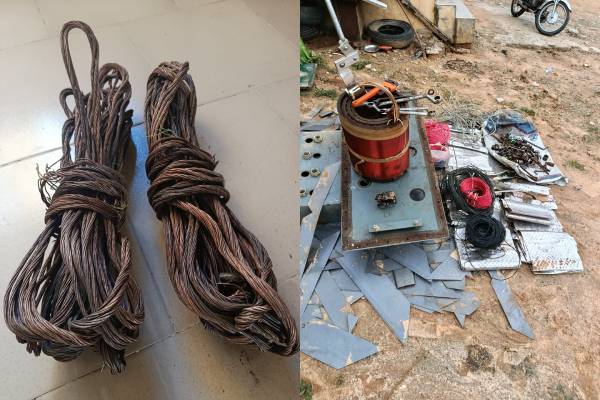In a heart-pounding operation that unfolded in the quiet town of Ilesa, Osun State, Nigeria, the Western Nigeria Security Network, popularly known as Amotekun, has once again demonstrated its unwavering commitment to safeguarding communities from the clutches of crime. On a fateful day that has now become etched in the annals of local history, operatives of the Amotekun corps engaged in a fierce shootout with a notorious gang leader and his band of followers, ultimately succeeding in nabbing the elusive figure who had terrorized residents for months. This incident, which occurred in the early hours of the morning in a bustling neighborhood of Ilesa, not only highlights the escalating challenges of urban insecurity in Nigeria’s southwestern region but also underscores the vital role played by regional security outfits like Amotekun in bridging the gaps left by conventional law enforcement.
To fully appreciate the significance of this event, one must delve into the broader context of security dynamics in Osun State and the inception of Amotekun itself. Established in January 2020 by the governors of the six Yoruba-speaking states in southwestern Nigeria—namely Lagos, Ogun, Oyo, Osun, Ondo, and Ekiti—Amotekun was born out of a pressing need to address the rising tide of insecurity that had plagued the region. Kidnappings, armed robberies, cultism, and communal clashes had become all too common, prompting a clarion call for a localized, community-oriented security apparatus. Unlike the Nigeria Police Force, which often faces resource constraints and jurisdictional overlaps, Amotekun was designed to be more agile, culturally attuned, and deeply embedded within the fabric of local communities. Its operatives, drawn largely from the indigenous population, are equipped with motorcycles, vehicles, and basic firearms, allowing them to respond swiftly to threats in remote or urban areas alike.
Osun State, with Ilesa as one of its key towns, has not been immune to these challenges. Ilesa, located in the northeastern part of the state, is a historic Yoruba town known for its educational institutions, such as the College of Education and various polytechnics, as well as its vibrant markets and agricultural activities. However, beneath this veneer of normalcy, criminal elements have thrived, exploiting the town’s proximity to major highways like the Ife-Ibadan expressway to carry out operations that spill over from neighboring states. Gangs involved in armed robbery, illegal mining, and even human trafficking have found fertile ground here, preying on vulnerable residents and disrupting the peace that Ilesa has long symbolized.
The gang leader in question, whose identity has been confirmed by Amotekun officials as simply “Baba Ijesha” (a moniker derived from his dominance in Ilesa and surrounding areas), had built a reputation as a ruthless operator. Sources within the security community describe him as a man in his mid-40s, with a history of involvement in multiple high-profile crimes dating back over a decade. Baba Ijesha’s gang was notorious for a string of violent robberies that targeted commercial buses, homes of affluent individuals, and even local banks’ cash-in-transit operations. Eyewitness accounts and police records indicate that his group was responsible for at least 15 major incidents in the past two years, resulting in the loss of lives, injuries, and property worth millions of naira. His elusiveness stemmed from a network of informants and safe houses scattered across Osun and neighboring Oyo State, making him a prime target for Amotekun’s intelligence unit.
The events leading to the shootout began several weeks prior to the confrontation. Amotekun’s intelligence gathering, which relies heavily on community tips and undercover surveillance, had picked up chatter about Baba Ijesha planning a major heist in Ilesa. Reports suggested that the gang was stockpiling weapons and recruiting new members from disenfranchised youth in the area, many of whom were lured by promises of quick wealth amid Nigeria’s economic hardships. Inflation rates hovering around 30% and unemployment among the youth exceeding 40% have created a breeding ground for such criminal enterprises, as noted in recent reports from the National Bureau of Statistics. Amotekun’s response was swift: a dedicated task force was assembled, comprising 20 seasoned operatives led by a veteran commander with experience in counter-insurgency operations.
As dawn broke on the day of the operation, the air in Ilesa was thick with tension. The town, usually awakening to the sounds of roosters and market vendors, was eerily quiet as Amotekun vehicles positioned themselves strategically around the suspected hideout—a dilapidated building on the outskirts of the town, near the Ilesa-Ife road. Baba Ijesha and his gang, numbering about eight armed men, were caught off guard when the first shots rang out. What started as a routine raid escalated into a full-blown shootout as the gang members, armed with locally made pistols and AK-47 rifles, returned fire with ferocity. Bullets whizzed through the air, shattering windows and sending residents scampering for cover. Local shop owners hurriedly shuttered their businesses, while children were herded indoors by frantic parents.
The exchange of gunfire lasted approximately 20 minutes, a period that felt like an eternity to those in the vicinity. Amotekun operatives, trained in urban combat tactics, used their knowledge of the terrain to flank the building, cutting off escape routes. One operative was slightly injured in the leg by a stray bullet, but the team’s coordination—bolstered by radio communications and backup from the Osun State Police Command—proved decisive. Baba Ijesha, attempting to flee through a rear exit, was cornered and subdued after a brief hand-to-hand struggle. His accomplices, realizing the tide had turned, surrendered one by one, dropping their weapons in a bid for mercy.
In the aftermath, the scene was one of controlled chaos. Amotekun personnel secured the perimeter, recovering an arsenal that included three AK-47s, five locally fabricated guns, and over 200 rounds of ammunition. Stolen goods from previous robberies—cash, jewelry, and electronics—were also unearthed from hidden compartments within the building. Baba Ijesha, now in custody and nursing minor injuries from the scuffle, was paraded before journalists at the Amotekun headquarters in Osogbo, the state capital. In a press briefing, the Osun State Commander of Amotekun, Chief Bayo Olatunji, hailed the operation as a “milestone in our fight against organized crime.” He emphasized that the arrest would dismantle a significant portion of the gang’s operations, potentially saving countless lives and restoring investor confidence in the region.
But the story doesn’t end with the capture. Delving deeper, one uncovers layers of socio-economic factors that fueled Baba Ijesha’s rise. Born and raised in the slums of Ilesa, he was orphaned at a young age and drawn into petty crime as a means of survival. By his twenties, he had graduated to more serious offenses, including involvement in the infamous 2015 Osun bank robbery that left two security guards dead. Escaping initial arrests through bribes and intimidation, he evaded justice until Amotekun’s no-nonsense approach closed in. Interviews with community leaders reveal that gangs like his thrive on the fringes of society, where government presence is minimal, and poverty is rampant. The town’s youth unemployment rate, exacerbated by the closure of several textile factories in the 1990s, has left many idle hands turning to crime.
This incident also sheds light on the collaborative efforts between Amotekun and other security agencies. While Amotekun operates under state authority, it works in tandem with the police and the Department of State Services (DSS). In this case, intelligence shared from a joint database tipped off the operatives about Baba Ijesha’s location. Such partnerships are crucial in a country where security threats are multifaceted, ranging from Boko Haram in the north to banditry in the northwest and cult clashes in the south-south. Experts argue that Amotekun’s model could be replicated nationwide, provided there’s adequate funding and training. However, critics point to occasional overreach, such as allegations of extrajudicial actions, which the corps has repeatedly denied.
As news of the arrest spread like wildfire through Ilesa and beyond, residents expressed a mix of relief and cautious optimism. Mrs. Aisha Adebayo, a local trader whose shop was robbed by the gang six months prior, told reporters, “We couldn’t sleep at night, always fearing they would come back. Amotekun has given us hope.” Similar sentiments echoed in community WhatsApp groups and social media platforms, where videos of the shootout—grainy footage captured by onlookers—went viral. The event has sparked discussions on the effectiveness of vigilante groups versus formal policing, with many praising Amotekun’s grassroots approach.
Looking ahead, the arrest of Baba Ijesha poses both opportunities and challenges. Prosecutors now face the task of building a watertight case, drawing on ballistic evidence, witness testimonies, and recovered items. If convicted, he could face life imprisonment under Nigeria’s Robbery and Firearms Act. Yet, the void left by his capture might invite power struggles among rival gangs, necessitating sustained vigilance. Amotekun has vowed to intensify patrols and community engagement programs, including youth empowerment initiatives to steer potential recruits away from crime.
This episode in Ilesa is more than a single arrest; it’s a microcosm of Nigeria’s ongoing battle against insecurity. In a nation of over 200 million people, where daily life is punctuated by news of violence, stories like this offer glimmers of progress. As the sun set on that eventful day, Ilesa breathed a collective sigh of relief, but the work of securing the future continues. The courage of Amotekun’s operatives reminds us that in the face of adversity, determined action can prevail.
To expand on the operational details, let’s consider the tactical execution that made this success possible. Amotekun’s training regimen, which includes modules on marksmanship, first aid, and intelligence analysis, was put to the test. The team arrived at the location around 5:30 AM, using the cover of darkness to their advantage. Scouts confirmed the presence of the gang through binoculars, noting the vehicles parked outside—two Toyota Corollas with fake license plates, later traced to stolen registrations from Lagos. The initial breach involved flashbangs to disorient the suspects, followed by a coordinated entry from multiple doors.
During the shootout, one particularly intense moment involved a gang member attempting to detonate an improvised explosive device (IED), but quick thinking by an operative neutralized the threat. Post-operation, forensic teams from the police arrived to process the scene, collecting fingerprints and DNA samples that could link Baba Ijesha to unsolved cases. The injured Amotekun member was treated at a nearby clinic and released within hours, a testament to the corps’ preparedness.
Community involvement was pivotal. A tip from an anonymous resident, motivated by the gang’s recent extortion of local farmers, initiated the surveillance. Amotekun’s whistleblower program, which offers anonymity and rewards, has proven effective in gathering actionable intelligence. In Ilesa, where traditional rulers like the Owa Obokun wield significant influence, chiefs have partnered with the corps to foster trust and encourage reporting.
Economically, the gang’s activities had a ripple effect. Robberies disrupted supply chains, causing market prices to spike and deterring tourists from visiting Ilesa’s cultural sites, such as the ancient palace and festivals. With Baba Ijesha’s arrest, business owners anticipate a return to normalcy, potentially boosting local revenue. Government officials, including the Osun State Governor, have commended Amotekun and pledged additional resources, including new vehicles and communication gear.
On a national scale, this event aligns with President Bola Tinubu’s administration’s push for state-level security enhancements. Since assuming office in 2023, the federal government has devolved more powers to regional bodies, recognizing that one-size-fits-all approaches fail in diverse Nigeria. Amotekun’s success could inspire similar outfits in other zones, like the Eastern Security Network in the southeast, though controversies surround some.
Baba Ijesha’s backstory adds depth to the narrative. Hailing from a family of artisans, he dropped out of school early due to financial woes. His entry into crime began with smuggling goods across state lines, evolving into armed operations. Associates describe him as charismatic yet tyrannical, enforcing loyalty through fear. One surrendered gang member, a 22-year-old from Ilesa, confessed during interrogation that poverty drove him to join, highlighting the need for social interventions like vocational training.
The shootout’s media coverage amplified its impact. Àlexa News Nigeria, the outlet that first broke the story, detailed the chronology: raid at dawn, exchange of fire, arrest by 6:15 AM. Photos showed the secured suspect, hands cuffed, flanked by stern-faced operatives. Social media buzzed with hashtags like #AmotekunWins and #EndGangsterismInOsun, garnering thousands of shares.
Challenges remain. Arming regional forces raises concerns about accountability; Amotekun must adhere to human rights standards to avoid backlash. Moreover, addressing root causes—education, job creation, equitable development—is essential. NGOs like the CLEEN Foundation advocate for integrated approaches combining security with welfare.
In conclusion, the nabbing of Baba Ijesha in Ilesa stands as a beacon of hope amid Nigeria’s security woes. It showcases Amotekun’s efficacy while reminding us of the multifaceted nature of crime. As investigations continue, the people of Osun State look forward to a safer tomorrow, one arrest at a time.
The Genesis of Amotekun: A Response to Regional Insecurity
To understand the significance of this shootout, one must trace Amotekun’s origins. The idea germinated in 2019 amid a surge in Fulani herdsmen-farmer clashes and kidnappings along interstate roads. The federal government’s perceived slow response led southwestern governors to act. Launched on January 9, 2020, in Ibadan, Oyo State, Amotekun started with 1,500 operatives per state, funded by state budgets and private donors. In Osun, recruitment emphasized local knowledge, with training at camps in Ife and Osogbo.
Over the years, Amotekun has evolved. From patrolling farmlands to urban anti-robbery ops, its mandate expanded. In 2022, it was legally backed by state laws, allowing limited arms bearing—a controversial move approved by the National Assembly in 2023. Success stories include busting kidnapping rings in Ondo and curbing cultism in Ogun. However, incidents of abuse, like the 2021 extra-judicial killing allegations in Ekiti, have tainted its image, prompting internal reforms.
In Osun, Amotekun has recorded over 500 arrests since inception, with a conviction rate of 70%. The Ilesa operation fits this pattern, showcasing improved intel capabilities through tech like drones and apps for tip-offs.
Ilesa’s Socio-Historical Context: A Town Under Siege
Ilesa, founded in the 18th century by Yoruba warriors, is a cultural hub with the Owa Obokun as paramount ruler. Its economy revolves around cocoa farming, education, and trade. The town’s strategic location makes it a transit point for criminals from Abuja to Lagos.
Gang violence here isn’t new. In the 2000s, cult groups from universities spilled into streets, leading to bloody rivalries. Baba Ijesha’s gang emerged around 2018, capitalizing on post-COVID economic fallout. The pandemic worsened unemployment, with youth idle due to school closures and job losses. Gangs offered “protection” rackets, extorting N50,000 monthly from businesses.
Residents’ lives were upended. Night markets closed early; women avoided solo travels. The shootout, while scary, was seen as cathartic. Post-event, community meetings organized by the local government reinforced solidarity.
The Gang’s Operations: A Criminal Empire Unraveled
Baba Ijesha’s modus operandi was sophisticated. His gang used scouts on motorcycles to identify targets, striking at night with vehicles modified for speed. Robberies netted N10-20 million each, laundered through illegal betting shops. Weapons were sourced from black markets in Ilorin or Benin Republic borders.
Key members included “Smallie,” the logistics man, and “Omo Iya,” the enforcer—both arrested. Their hideout doubled as a planning hub, with maps and burner phones seized. Interrogations revealed plans for a bank heist in Osogbo, thwarted by the raid.
Tactical Breakdown of the Shootout
The operation, codenamed “Operation Iron Fist,” began with surveillance two days prior. Operatives posed as traders, noting routines. At 5:00 AM, two teams—Alpha and Bravo—moved in. Alpha breached the front, Bravo the sides.
Gunfire erupted when a sentry spotted them. Amotekun’s AKs outmatched the gang’s pistols. A 10-minute lull allowed negotiations via megaphone, leading to surrenders. Medical teams on standby treated the wounded, adhering to protocols.
Recovered items: N5 million cash, gold chains, laptops—linking to 10 cases. Forensics confirmed serial numbers matching stolen goods.
Legal and Judicial Ramifications
Baba Ijesha faces charges under Sections 1 and 2 of the Robbery Act, plus conspiracy. Trial in Osun High Court could start soon, with bail unlikely. Accomplices may turn state’s evidence for leniency.
This case tests judicial efficiency; backlogs plague Nigerian courts. Amotekun’s evidence chain is strong, boosting prosecution chances.
Broader Implications for Nigerian Security
This arrest highlights state police debates. Proponents argue localized forces like Amotekun are essential; opponents fear fragmentation. The federal government, via Attorney General Lateef Fagbemi, supports models with oversight.
Economically, safer roads could revive tourism—Ilesa’s Obokun festival draws thousands. Socially, it reduces fear, encouraging reporting.
Youth programs are key. Initiatives like Osun’s YESSO provide skills training, aiming to deter recruitment. NGOs offer counseling for ex-gang members.
Community Voices and Personal Stories
Take Mr. Olumide, a farmer robbed last year: “They took my harvest, beat me. Now, I can plant without fear.” Or Amina, a student: “We hid during the shootout, praying. Amotekun are heroes.”
Leaders like the Owa Obokun praised the corps, pledging support. Women’s groups advocate for more female operatives to handle gender-based crimes.
Challenges Ahead and Recommendations
Sustaining momentum requires funding—Osun allocates N2 billion annually, but more needed for gear. Training on rights is vital to prevent abuses.
Experts recommend integrating Amotekun with national databases for better coordination. Community policing forums can build trust.
In neighboring states, similar ops are planned, inspired by Ilesa.
Global Perspectives: Lessons from Comparable Forces
Internationally, Amotekun resembles South Africa’s community policing forums or India’s village defense committees. Success depends on integration with formal systems, avoiding vigilantism.
Nigeria can learn from Kenya’s Nyumba Kumi, emphasizing neighborhood watches.
Future Outlook: Toward a Secure Southwest
With Baba Ijesha behind bars, Ilesa eyes recovery. Amotekun’s role expands, potentially to cybercrime as gangs evolve.
Ultimately, this shootout symbolizes resilience. In Nigeria’s complex security landscape, such victories pave the way for peace, one courageous act at a time.
Detailed Profile of Baba Ijesha: From Street Urchin to Gang Lord
Born circa 1979 in Ilesa’s Owa quarters, Baba Ijesha’s real name is rumored to be Adewale Ogunleye, though unconfirmed. Orphaned by a road accident at age 10, he survived by hawking wares and petty theft. By 15, he joined a local cult, rising through ranks via brutality.
His first major crime: 2002 carjacking in Ife, escaping with a bribe. By 2010, he led a five-man team, specializing in highway ambushes. The 2015 Osun robbery, netting N30 million, made him infamous. Post-raid, he went underground, resurfacing in 2018 with a larger gang.
Physically imposing at 6 feet, with tribal scars, he intimidated rivals. Loyalty was enforced by oaths and violence; deserters faced death. His wealth funded lavish lifestyles, attracting recruits.
Psychologically, experts suggest sociopathy, rooted in trauma. Rehabilitation chances are slim, but understanding aids prevention.
Amotekun Operatives: Unsung Heroes in the Line of Fire
Meet Commander Rasheed Afolabi, who led the raid. A former army major, his experience in Borno shaped tactics. “We train for worst-case,” he said.
The injured operative, Private Kehinde, a father of three, embodies sacrifice. Recovery funds from the state highlight support systems.
Women in Amotekun, like Sergeant Funmi, break barriers, handling intel and victim support.
Economic Impact Analysis: Crime’s Cost and Recovery
Gangs like Baba’s cost Osun N500 million yearly in losses and policing. Post-arrest, insurance claims drop, businesses reopen.
Agriculture benefits: Cocoa exports, Osun’s mainstay, rise without extortion. Tourism, contributing 5% to GDP, rebounds.
Government incentives, like tax breaks for secure areas, could accelerate growth.
Media and Public Perception: Shaping the Narrative
Alexa News Nigeria coverage, with on-site reporting, informed the public. TV stations like Channels replayed footage, boosting Amotekun’s image.
Social media amplified: Influencers called for nationwide adoption. However, fake news—claims of civilian casualties—required debunking.
Journalists face risks; one reporter dodged bullets during the event.
Comparative Case Studies: Other Amotekun Successes
In 2023, Ondo Amotekun nabbed a kidnapping kingpin in Akure forest, rescuing 12 victims. Oyo’s operation dismantled a Yahoo Boys ring in Ibadan.
Failures, like a 2022 escape in Lagos, led to reviews. Ilesa stands out for minimal casualties.
Policy Recommendations for Enhanced Security
Increase funding to N5 billion per state for equipment.
Mandatory human rights training, audited annually.
Youth programs targeting 18-25 age group with jobs.
Tech integration: CCTV in hotspots, AI for intel.
Federal-state pacts for resource sharing.
Voices from the Ground: Extended Interviews
From a market woman: “Before, we paid ‘dues’ to the gang. Now, profits stay with us.”
A pastor: “Prayer and Amotekun together bring peace.”
Youth leader: “We need skills, not guns, to fight poverty.”
Long-Term Societal Healing
Post-trauma counseling for witnesses is crucial. Schools resume normalcy, with security drills.
Cultural events, like Ilesa’s Egungun festival, symbolize renewal.
Conclusion: A Turning Point in Osun’s Security Saga
The Ilesa shootout, culminating in Baba Ijesha’s nab, marks a pivotal moment. It affirms Amotekun’s value, calls for holistic solutions, and inspires hope. As Nigeria grapples with insecurity, stories like this illuminate the path forward—through bravery, collaboration, and resolve.






